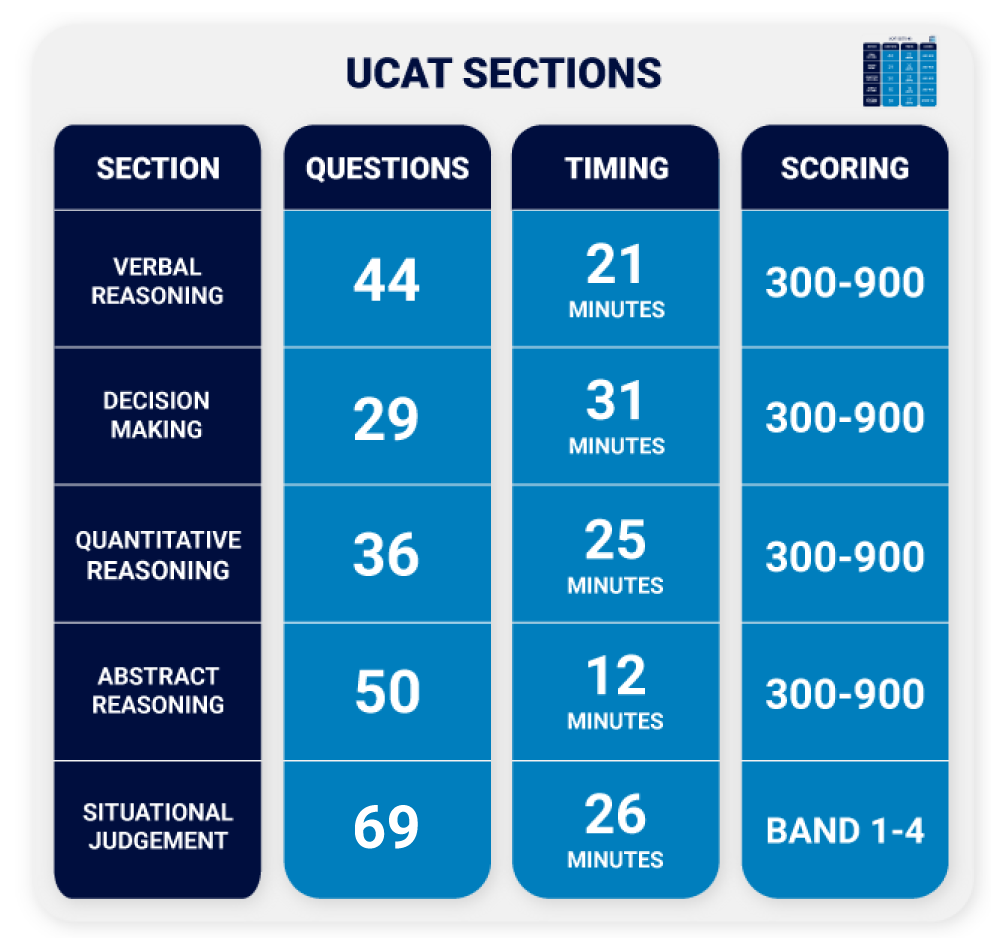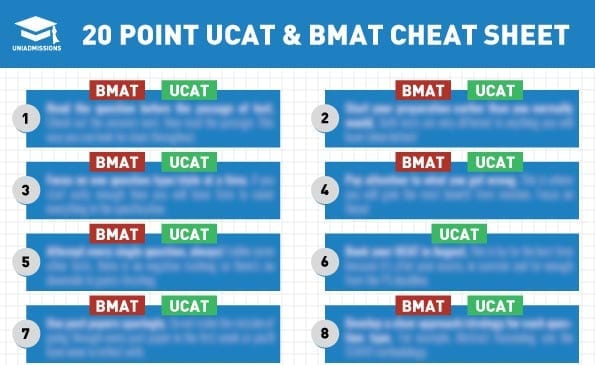UCAT CHANGES 2025
The Abstract Reasoning subtest will be removed from the UCAT in 2025. This will impact the timings and question totals of most other subtests. At UniAdmissions, we aim to provide the most recent information to all of our visitors as soon as possible.
All UK medical schools require you to take either the UCAT or BMAT.
These Admissions Tests are held in the summer or autumn of the year you apply to Medicine (the year before you would actually start the degree).
Most medical applicants tend to take both exams (to keep as many options open or to apply to schools they prefer the location/teaching style). Some students just take the UCAT as there are three times as many UCAT schools as BMAT schools.
A few students just sit the BMAT, but to conclude, there’s no way around having to revise and sit at least one Admissions Test, so which one should you pick, or should you go for both?
- Note: The UKCAT is now called the UCAT - the tests are completely identical so any reference to the UKCAT can be applied to the UCAT.
BMAT Vs UCAT - The Universities
The tables below demonstrate the UCAT Universities and the BMAT Universities:
BMAT Universities
| BMAT Universities | ||
|---|---|---|
| Cambridge | Lancaster | Oxford |
UCAT Universities
| UCAT Universities | ||
|---|---|---|
| Aberdeen | Glasgow | Nottingham |
| Anglia Ruskin | Hull-York | Norwich |
| Aston | Imperial College London | Plymouth |
| Birmingham | Keele | Queen Mary, London |
| Brighton and Sussex | Kent and Medway | Queen’s Belfast |
| Bristol | King’s College London | Sheffield |
| Brunel | Leeds | Southampton |
| Cardiff | Leicester | St Andrews |
| Dundee | Liverpool | St George’s |
| Edge Hill | Lincoln | UCL |
| Edinburgh | Manchester | Warwick |
| Exeter | Newcastle |
Set on studying Medicine? The UCAT and BMAT are tough hurdles, but with our support, we’ll help you receive your dream offer.
UniAdmissions Medicine Programme is designed with the sole focus of getting you your offer. Students enrolled on our Programme have triple the chances of success. Not applying to Oxbridge Medicine? Click here for non-Oxbridge medicine premium programmes.
Get started with your Medicine Premium Programme today by speaking with an expert Admissions Consultant for free.
BMAT vs UCAT - Exam Content
Although both the UCAT and BMAT test the way that you think, they consist of different sections that test different aptitudes to each other.
BMAT Structure
Section 1 of the BMAT tests critical thinking, numerical and spatial reasoning and problem-solving, similar to the skills needed for the UCAT, but all of the questions are mixed into one section.
Section 2 tests scientific knowledge (to GCSE standard) and section 3 tests your ability to structure and write an argument. Often, students struggle with one of these sections. If you’re more mathematically minded, you might find essay writing harder, or the reverse may be true (unless you’re the lucky few who are confident in every section).
You can find plenty of past BMAT papers to work through in preparation for the admissions test.
These extra skills tested in the BMAT as compared to the UCAT are an important consideration when choosing which exams to take.
UCAT Structure
The UCAT test is split up into 5 sections: quantitative reasoning, verbal reasoning, abstract reasoning, decision making and situational judgement.

Is the BMAT Harder than the UCAT?
A common question that comes up when discussing these exams is if the BMAT is harder than the UCAT. The BMAT tests applicants on a larger variety of skills and can contain some fairly challenging questions, especially in Sections 2 and 3. However, there are really two ways of looking at this question.
The BMAT can be seen as more challenging as it requires a lot more knowledge and tests more skills. As well as the thinking skills tested in the UCAT, applicants will also need to answer a selection of Maths and Science questions and write a whole essay about an unknown topic. Even if you do well in one or two sections of the BMAT, you may find that you struggle in the third which could bring your overall score down if you didn’t properly prepare.
The BMAT is not any more difficult than the UCAT if you are even moderately competent at each of the three primary skills that are being tested.
Section 1 tests the same general skills as the UCAT, but with far fewer questions and a more generous time limit. The variety of questions is also much more limited, with no Abstract Reasoning or Situational Judgement included.
Section 2 requires scientific and mathematical knowledge, but the questions themselves are typically around GCSE-level difficulty, which most medicine applicants should find less challenging. As you should be studying at least two scientific/mathematical subjects in your A-Levels or equivalent, you won’t find much in this section that is unexpected or unknown to you.
Section 3 requires you to write a convincing essay that answers a fairly tough question. However, given the short period of time you will have to write it, you will only need to write around 700 words and will not be expected to provide a comprehensive analysis of the subject. What’s more, not every university will even consider Section 3 seriously in your application, instead focusing on the first two sections.
BMAT vs UCAT - Dates
The BMAT and UCAT differ with key dates and it is important to know the difference, especially if you are taking both.
BMAT Test Dates
The usual recently changed October BMAT Dates:
- 1st September – Booking Opens
- 1st October – Booking Finishes
- 18th November – Test Date
- 26th November – Results Released
UCAT Test Dates
Here are the 2023 Key UCAT Dates:
- 20th June – Booking Opens
- 10th July – Testing Starts
- 21nd September – Booking Deadline
- 28th October – Final Test Date
- Early November – Results Sent To Universities
BMAT vs UCAT - Costs
BMAT Costs
- £61 – EU and UK
- £92 – Outside EU and UK
- £34 – Late registration fee
- £36 – Results enquiries
- £36 – Application for appeals
The BMAT costs can be reimbursed based on your circumstances.
UCAT Costs
- £70 – Taken in UK
- £115 – Taken outside UK
- £34 – Late registration fee
There is a UCAT Bursary Scheme which opens on the 24th of May and the application deadline is the 30th of September.
BMAT vs UCAT - Scoring And Results
A major difference between the UCAT and BMAT is when you find out your scores.
BMAT Results
There are three sections within the test, with section 1 and 2 marked on a scale of 1 (low) to 9 (high). Although the score goes up to 9, fewer than 1% of candidates receive this. Most score between 4.3 and 4.7 for sections 1 and 2 respectively.
Section 3 differs from the previous two, as it is scored on Quality of Content, which ranges from 0 (low) to 5 (high), and Quality of English on a scale of A (high) to C to E (low). So, for example, you might receive a 4A on this section. At a minimum, an A grade is required for Quality of English considering over 70% of candidates achieve this.
If you take the BMAT, most students now sit it in October, and your BMAT results will be released around 3 weeks after your test day. In 2021, results were released on the 26th of November.
UCAT Results
The first four sections of the UCAT (verbal reasoning, quantitative reasoning, abstract reasoning, and decision making), are scaled onto a scale from 300 – 900. The totals from each of the four sections are added together to give your overall UCAT score out of 3,600.
The Situational Judgement Test is scored differently because the answers can be close to correct, but not exactly correct. The score is provided in one of four bands. If your answer is close to the correct answer, you will get some points:
- Band 1 – Performed at an excellent level, displaying judgement similar to the majority of the expert panel.
- Band 2 – Displayed a decent level of performance, often demonstrating appropriate judgement, with several responses corresponding to model answers.
- Band 3 – Performed at a modest level, displaying appropriate judgement for some questions and significant differences from model responses for other questions.
- Band 4 – Performed poorly, displaying significantly different judgement than the model response in several cases.
For the UCAT results, you will receive your results as soon as you walk out of your exam. You will therefore know your scores before you apply to medical schools. This is good because you will have a better idea of which medical schools might accept you by looking at their average acceptance scores and threshold scores.
In Conclusion
The general advice is that all medical and dental applicants should take the UCAT as you will receive your results before applying so you can then make the decision as to whether to apply to UCAT medical schools based on your mark. This means that there’s really nothing to lose from taking the UCAT.
Taking the BMAT exam means you will have applied to medical schools before taking the exam. However, the BMAT is a good alternative if you have not achieved a high enough score in the UCAT, or, if you would like to study at the BMAT medical schools.
Maximise your UCAT and BMAT score through effective Admissions Test preparation.









